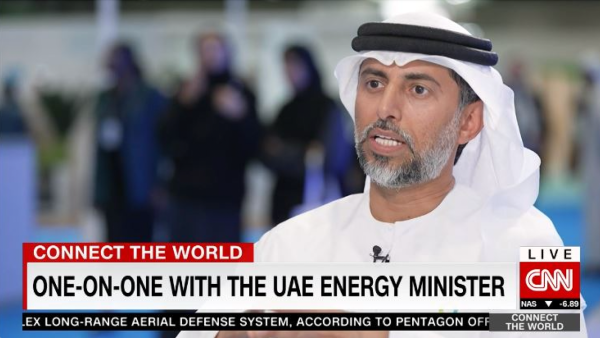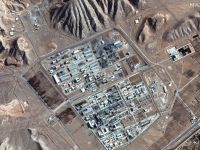Oil prices need to be affordable during a clean energy transition – UAE Energy Minister

In an interview with CNN anchor and correspondent Becky Anderson at Abu Dhabi Sustainability Week, UAE Energy Minister Suhail Al Mazrouei discusses the UAE’s commitment to transition into renewables but said controlling a rise in oil prices during the transition is needed, especially when no energy alternatives are available to consumers and countries that are “totally a hundred percent green” except nuclear.
Al Mazrouei also reiterated calls for technology investments that would target emissions.
“We need to fight the emissions, not the fuel,” he said.
Key Quotes:
On the UAE's commitment to energy transition and plans to increase production to 5 million barrels per day from the current just over three
“We are transitioning. One thing that is not helping is a high volatile commodity prices, whether it's oil. So, we're trying to avoid what happened in the gas by encouraging investments. We spoke with everyone we encourage everyone we saw very slow response.”
“We brought forward our target of 5 million to 2027 to provide the maximum support to this transition toward clean forms of energy. We thought bringing it forward will help stabilizing the prices avoiding high volatile oil market. And we are trying to do it with the growth. We need to make the energy prices affordable during transition.”
“People are thinking about three things, but they prioritize them differently security of supply, affordability and sustainability. We need to work on the three of them not only pick one and say this is the most important and forget the other two.”
On whether upping investment in oil and gas here puts UAE in conflict with global climate goals
“There is no base load currently that is available to consumers and countries that is a totally 100 percent Green, unless you're talking about nuclear. So being practical, we know that the highest contribution will come from renewable energy. That's why we believe in it, we're investing in it. But at the same time, someone needs to be investing in the base load; someone needs to be investing in hydrocarbon.”
“The problem is the IOCs are reluctant, because of their shareholders. There is no clarity on who is going to invest and what is the demand in certain countries moving forward. You need to juggle with the three challenges, sustainability, security of supply, and affordability.”
On how China’s reopening will impact the oil market short term
“Well, definitely there is a demand pickup with China opening but also there is a slowdown that we have noticed in the demand from the many countries due to the economic situation and how things are.”
“We are also having a mild winter this year, luckily, for gas consumption so all of these have helped also the demand side. There is an issue in supply. There is an issue that we've been always talking about, which is the lack of investments. And we are at a very important transition. And we need to have resources available. The group, OPEC Plus they will always do their best.”
Background Information
CNN
With its strong heritage of offering extensive coverage and analysis of international events and stories of global importance, CNN is the world’s leading global 24-hour news network celebrating more than 30 years at the forefront of delivering fast, accurate, impartial news to a global audience of more than 260 million households.
With its global team of 4,000 news professionals based across 45 bureaux worldwide, CNN continues to invest in intelligent and compelling news, feature and documentary programming across its traditional and digital platforms.
CNN’s service continues to evolve, embracing social media, encouraging user-generated content via its community site iReport and reaching its audiences in new and exciting ways. CNN can be accessed online and on mobile devices and its distribution outlets include airports, hotel rooms, cruise ships and syndicated news agencies.






